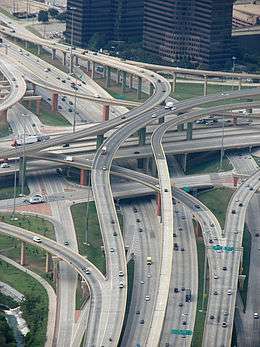Three-level diamond interchange

A three-level diamond interchange is a type of highway interchange where through traffic on both main roads is grade-separated from intersections which handle transferring traffic.[1] It is similar in design to a three-level stacked roundabout except for its use of (usually signalled) conventional intersections, and can be thought of as two diamond interchanges fused together.
Road enthusiasts sometimes use the terms volleyball interchange or split-level diamond interchange to refer to these interchanges.[2]
Description
In a three-level diamond interchange, the two main roads are on separate levels, and on a third level, usually in the middle, there is a square of one-way roads. The square circulates clockwise where traffic drives on the left, or anticlockwise where it drives on the right. At each corner of the square is the terminal of an exit ramp from one main road and an entrance ramp to the other main road.
Traffic transferring from one road to the other to make an overall right turn only passes through one corner of the square, at which point a right turn is made. Transfer traffic making an overall left turn must proceed straight through the first intersection it encounters, turn left at the next, and then proceed straight through a third intersection to enter the other main roadway.
Examples
| Location | First Route | Second Route | Notes |
|---|---|---|---|
| Cedar Rapids, Iowa | |
|
Collector/distributor roads intersect. |
| Detroit, Michigan | |
|
I-75 uses frontage roads |
| |
|
||
| |
|
Includes slip ramps from northbound M-10 to westbound M-102, eastbound M-102 to southbound M-10, and westbound M-102 to northbound M-10. M-10 uses frontage roads | |
| Redford Township, Michigan | |
|
I-96 uses frontage roads |
| Jefferson City, Missouri | |
|
A flyover ramp has been added to allow westbound US 54 traffic to join US 50 east, bypassing one intersection. This addition necessitates the use of a nearby city street to transfer from westbound US 50 to westbound US 54. |
| Asheville, North Carolina | |
|
I-240 exit 7 |
| High Point, North Carolina | |
|
I-74 exit 71B |
| Oklahoma City, Oklahoma | |
John Kilpatrick Turnpike | A flyover ramp has been added to allow westbound Kilpatrick Turnpike traffic to join State Highway 74 south, bypassing one intection. |
| Marple Township, Delaware County, Pennsylvania | |
|
I-476 exit 5 |
| Robinson Township, Washington County, Pennsylvania | |
|
PA 576 exit 6; partially completed, temporary terminus of PA 576 |
| Dallas, Texas | |
Spring Valley Road | Includes frontage roads at-grade with interchange |
| Frisco, Texas | |
|
Includes frontage roads at-grade with interchange |
| Round Rock, Texas | |
|
Includes frontage roads at-grade with interchange |
| Sherman, Texas | |
|
Includes frontage roads at-grade with interchange |
| Waco, Texas | |
|
Includes frontage roads at-grade with interchange |
| Alexandria, Virginia | |
Seminary Road | I-395 exit 4 |
| Fairfax County, Virginia | |
|
The south end of West Ox Road also meets this interchange. |
| Welch, West Virginia | |
|
As of 2011, grading has been completed for interchange but interchange itself has not been constructed. |
| Wheeling, West Virginia | |
|
Entire interchange is elevated above city streets. |
| Wauwatosa, Wisconsin | |
|
An access road for the adjacent Harley-Davidson plant is also part of the interchange. |
| Belmont, Queensland, Australia | |
|
Two of the ramps are two-way for a short distance to allow access from the interchange to and from local streets. |
| Düsseldorf-Stockum, Germany | Autobahn 44 | Bundesstraße 8 | At 51°16′16.9″N 6°45′1.8″E / 51.271361°N 6.750500°E; rare design in Germany |
Many examples of this interchange type can also be found in Texas; however, the interchanges almost always include the frontage roads as well. If the traffic amounts increase, the interchange is usually converted into a stack interchange, also as the second level of the High Five Interchange.
References
- ↑ Indiana Department of Transportation, "Interchanges" (PDF). (203 KiB), pages 21 and 22
- ↑ Oglesby, Scott. "Volleyball Interchange". Kurumi's Field Guide to Interchanges. Retrieved 23 August 2013.
External links
- Aerial view of a three-level diamond interchange (Interstate 380 and Iowa Highway 100 in Cedar Rapids, Iowa). Highway 100 runs from left to right; Interstate 380 runs from top to bottom.
